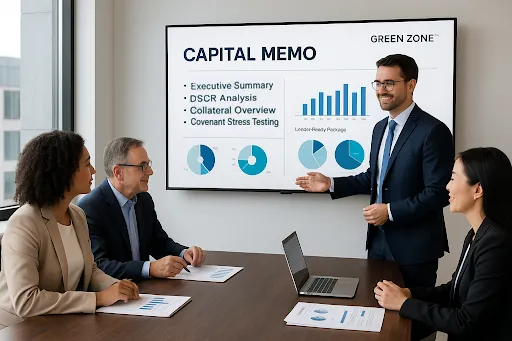
Think Your Credit Renewal Will Be Easy? Why That Assumption Could Cost You in 2025
Renewing your line of credit used to be simple. Your bank sent over paperwork, your team sent updated financials, and everything rolled forward without issue.
That’s not how it works anymore.
In 2025, middle-market CFOs and business owners are discovering just how much the rules have changed. And those who assume it’s still a routine process are often blindsided by delays, rejections, and deal terms that restrict growth.
The truth is, the lending landscape has become more complex, more cautious, and far more demanding—especially for businesses requesting larger credit facilities or adjusting their structure to support expansion.
If you’re heading into a renewal or a new capital request with your bank, your biggest risk may be underestimating the process.
Why the Renewal Process Feels So Much Harder Now
Even companies with strong financials are facing more resistance from their banks. The shift isn’t about poor performance—it’s about a rising internal bar for approval and a growing disconnect between borrower expectations and how banks now operate.
Here’s what we see across the commercial credit space:
Banks are imposing higher DSCR minimums (often >1.30x)
Loan covenants are getting more restrictive—even for renewals
Liquidity thresholds are up, especially for revolving lines
Underwriters are looking harder at global cash flow and leverage
Internal bank reviews take longer and require more documentation
If you’re assuming your bank will offer the same structure, terms, or timeline as before, you may already be behind.
The Pressure CFOs Feel—But Don’t Talk About
In many cases, a company’s CFO is the person expected to “just handle it.” But the time commitment, complexity, and pressure around getting this right have all grown dramatically.
CFOs are managing 30–50% of their week on renewal activity
They’re fielding constant lender follow-up questions and data requests
And they’re doing all of this while still managing cash flow, vendor relationships, and audits
Worse, many CFOs are afraid to raise their hand and say, “I need help,” fearing the ownership team may think they’re not up to the task.
But what happens if they go it alone—and get it wrong?
A poorly structured renewal can restrict growth, trigger unanticipated covenant issues, or introduce collateral language that impacts your liquidity next quarter. Those consequences may not show up the day the deal closes—but they’ll show up when you need that flexibility the most.
Discover the secret weapon high-flying finance teams won't renew without: Green Zone! Dive into why savvy CFOs are turning to expert external support to supercharge their renewal strategies.
Green Zone: Built to Help You Get It Right the First Time
At Green Zone Capital Advisors, we were commercial and ABL lenders. We built credit memos. We sat on credit committees. And we know exactly what makes a bank say “yes” versus what makes them stall.
Now, we use that inside knowledge to protect middle-market businesses from costly mistakes.
Our process is simple but powerful:
We build a Capital Memo that mirrors what banks expect internally
We test your deal with anonymous lender interviews to validate appetite
We guide your team through covenant strategy, DSCR presentation, and term sheet negotiation
And we do it all confidentially—making you look more prepared and strategic to your ownership team, not less
Discover how the power of a well-crafted Capital Memo can be the defining factor between securing favorable terms or grappling with constraining conditions for your thriving business.
What Happens If You Don’t Prepare?
If your renewal or facility request doesn’t align with your lender’s risk criteria, you may experience:
Term sheets with unfavorable conditions
Unexplained delays that tie up working capital
Downgrades in internal credit ratings
Reputational risk with ownership or investors
Even if you’re eventually approved, the wrong terms can haunt your business for years. One company we supported recently approached us after their lender proposed a $3MM line renewal with tighter covenants, a liquidity sweep, and a blanket lien across unrelated entities.
They assumed the bank would “work it out.” Instead, they lost negotiating power—and nearly lost a growth opportunity due to cash constraints.
This Isn’t About Your Capabilities—It’s About Risk Management
We’ve worked with CFOs from sponsor-backed PortCos, family-owned manufacturers, and high-growth services firms. And one thing is consistent:
They’re capable. They’re overworked. And they know the stakes are high.
Bringing in Green Zone isn’t a sign of weakness—it’s a strategy to reduce execution risk, eliminate stress, and create better outcomes for the company and the executive team.
If you’re preparing for a credit renewal, expansion, or restructuring, don’t assume the old rules still apply. Get ahead of the process. Protect your time and credibility. And make sure your company gets the right capital structure the first time.
